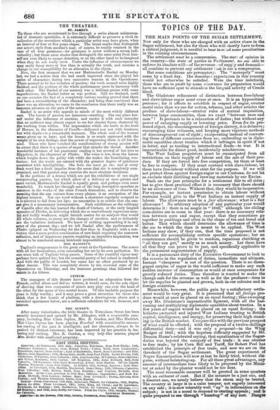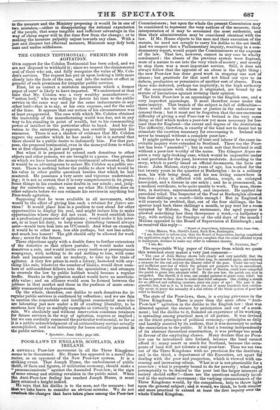TOPICS OF THE DAY.
THE MAIN POINTS OF THE SUGAR SETTLEMENT. Noz only for those who are charged with an active share in the- Sugar settlement, but also for those who will shortly have to form. a critical judgment, it is needful to bear in mInd some peculiarities in the existing circumstances. The settlement must be a compromise. The state of opinion in the country—the state of parties in Parliament, no one able to enforce its absolute will—of the revenue—of supply and demand— all combine to prevent any settlement tliat is not a compromise. But some conditions are peremptory. The "monopoly" must cease by a fixed day. The dominant expectation in this country would not otherwise be satisfied. Were the time indefinite, those who are to profit by some allowance for preparation would have no sufficient spur to stimulate the languid activity of Creole blood.
The Gladstone refinement of distinction between free-labonr and slave-labour sugar must cease at once. It is an hypocritical pretence; for it affects to establish in respect of sugar, straiter moral rules than we use for cotton, tobacco, and other articles the produce of slave-labour—straiter rules of mutual inquisition, between large communities, than we exact "between man and. man" ! It pretends to be a relaxation of duties ; but without any power of enlarging supply or lowering price. Even for its pro- fessed object, the discouragement of foreign slavery, it is delusive; encouraging false reliances, and keeping more vigorous methods of discouragement out of sight ; exasperating instead of convert- ing those of different conscience from us; embroiling us in diplo- matic squabbles about treaties which it infringes in spirit if not in letter, and so tending to international feuds—to war. It is impracticable for direct good, incidentally mischievous.
The West Indian proprietors must be emancipated from all restrictions on their supply of labour and the sale of their prd- duce. If they are forced into free competition, let them at least be free to compete. If they must contend with slave-labour, let them have free-labour without stint for the purpose. If we will not protect them against foreign sugar in our Customs, do not let, us exclude their distilling and brewing materials by our Excise.
Such are the just principles for a settlement fair to all sides; but to give them practical effect it is necessary that there should be an allowance of time. Without that, they would be inoperative: For example, no instant permission to obtain labour without restraint would give to the West Indians an instant supply of labour. The allowance must be a fair allowance : what is a fair allowance ? No arbitrary adoption of any particular year would determine it : there is no magic in " 1849,' although the sliding corn-duties are to cease in that year: there is no necessary rela. tion between corn and sugar, except that they sometimes go together in puddings and often in the shape of tea and bread and butter. That which should determine the allowance of time is the use to which the time is meant to be applied. The West Indians may show, if they can, that the time proposed is not sufficient for accomplishing certain specific operations ; but ne countenance should be given to random, rapacious clutching at " all they can get," merely as so much money. Let them have all that they can prove to be just, and specifically applicable to the permanent augmentation of supply. It is a paramount duty of the Executive Government to look to the revenue in the regulation of duties, immediate and ultimate. Instant " cheapness " is out of the question. There is no disen- gaged surplus of sugar in the world sufficient to make any such sudden increase of consumption as would at once compensate for greatly reduced duties. Time therefore is wanted to make the change safe for the revenue as well as for the producer—time to let the supplies be planted and grown, both in our colonies anclin foreign countries. Meanwhile, however, the public gain by a satisfactory settle& ment would be very great. It is presumed that all foreign pro' duce would at once be placed on an equal footing; thus sweeping away Mr. Gladstone's impracticable figment, with all the hare rassing and multiplying diplomatic squabbles about treaties. In a few years all sugars would be placed on an equal footing ; the hitherto protected and injured West Indians trusting to British capital, intelligence, and energy, for preserving their high stand- ing in the British market. Compare this with the previous prospect of what could be effected ; with the proposal of a twelve-shilluo differential duty—and it was only a proposal—in the Whig Budget of 1841; with the hopeless difficulty suggested by Mr. Deacon Hume's celebrated saying, that equalization of the Sugar- duties was beyond the category of free trade : it was ulterior to free trade ; by his Corn Bill and Tariff, Sir Robert Peel has established the principle of free trade, and now we are on the threshold of the Sugar settlement. The great experiment of Negro Emancipation will now at last be fairly tried, without dis- guise, without bolstering-up. For all these great advantages, any amount of intermediate time likely to be proposed by the Minis- ter or asked by the planter would not be too dear.
The most reasonable measure will be greeted in some quarter with an outburst of cant. But if the measure be a just one, and a discreet one, we nrmly believe that the storm may be braded. The country at large is in a calm temper, not eagerly interested on any side ; it is now tolerably well " up" in information on the
subject ; is not in a mood to respond to canting appeals ; and is quite prepared to see through "humbug" of any sort. Danger
to the measure and the Ministry proposing it would lie in one of two mistakes,—either in disappointing the rational expectation of the people, that some tangible and sufficient advantage in the way of cheap sugar will in due time flow from the change ; or in making the measure palpably unjust towards any class. With a just and discreet but effectual measure, Ministers may defy both cant and undue selfishness.



























 Previous page
Previous page